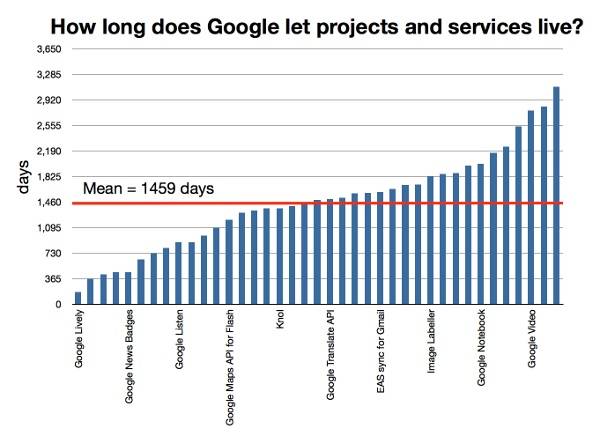Boing Boing's Journal
[Most Recent Entries]
[Calendar View]
[Friends View]
Saturday, March 23rd, 2013
| Time |
Event |
| 6:26a |
How long should we expect Google Keep to last? http://feedproxy.google.com/~r/boingboing/iBag/~3/EBD-MugggRo/how-long-should-we-expect-goog.html http://boingboing.net/?p=220558

On the Guardian, Charles Arthur has totted up the lifespan of 39 products and services that Google has killed off in the past due to insufficient public interest. One interesting finding is that Google is becoming less patient with its less popular progeny, with an accelerating trend to killing off products that aren't cutting it. This was occasioned by the launch of Google Keep, a networked note-taking app which has the potential to become quite central to your workflow, and to be quite disruptive if Google kills it -- much like Google Reader, which is scheduled for impending switch-off.
So if you want to know when Google Keep, opened for business on 21 March 2013, will probably shut - again, assuming Google decides it's just not working - then, the mean suggests the answer is: 18 March 2017. That's about long enough for you to cram lots of information that you might rely on into it; and also long enough for Google to discover that, well, people aren't using it to the extent that it hoped. Much the same as happened with Knol (lifespan: 1,377 days, from 23 July 2008 to 30 April 2012), or Wave (1,095 days, from May 2009 - 30 April 2012) or of course Reader (2,824 days, from 7 October 2005 to 1 July 2013).
If you want to play around further with the numbers, then if we assume that closures occur randomly as a normal distribution around the mean, and that Google is going to shut Google Keep, then there's a 68% chance that the closure will occur between April 2015 and February 2019. Even the later date wouldn't be much longer than Evernote - which is still growing - has already lasted. Is Google really that committed to Keep?
Google Keep? It'll probably be with us until March 2017 - on average
(via /.) | | 7:25a |
| | 8:31a |
We have a choice about the world that technology will give us http://feedproxy.google.com/~r/boingboing/iBag/~3/0Qf2ryDpgHI/we-have-a-choice-about-the-wor.html http://boingboing.net/?p=220565
Phil Windley, former CTO of Utah and now CTO of a startup called Kynetx, has an inspiring, brief piece on how technologists can help build a technological world where technology helps us live better lives over which we have more control, and how a failure to do something to build this world will give us a place where we are continuously spied upon and manipulated.
We probably don’t really have a choice about whether a $0.03 wireless sensor platform will exist. Technology marches on.
But we do have a choice about how it will be employed. If we follow the path we’re on now, all those devices will be controlled by some company somewhere that is providing the service behind them. All that data that all those devices are gathering about you will be streamed back to a walled garden via an encrypted channel to end up as fodder for some big data analytics platform that will be used by someone to sell you more stuff. You will be spied on by everything around you with no rational way to understand where all that data is going and how it’s being used. We’ll create government regulations that will do little to rationalize your world or help you understand it because they will only succeed in further Balkanizing it.
There is another path: in this alternate world all the devices that are related to you will push their data into a place that you control. This will seem rational and natural because the model will follow the structure of the world you’re already used to with clear delineations between public and private spaces and easy-to-understand controls over how data is used and shared. I say “natural” in a literal way. This is the way the physical world works and we’re all used to it. In this alternate world you are in control.
Build the World You Want to Live In
(via Hack the Planet)
 | | 10:38a |
| | 11:39a |
Congressman boasts on Twitter about the money he got to support CISPA, then thinks better of it http://feedproxy.google.com/~r/boingboing/iBag/~3/CSi7JHVHPn8/congressman-boasts-on-twitter.html http://boingboing.net/?p=220568

CISPA is a bill before Congress that will radically increase the ease with which the government and police can spy on people without any particular suspicion. It is being rammed through by people like Rep. Mike Rogers (R-MI), who received a small fortune in funding from the companies that stand to get rich building the surveillance tech CISPA will make possible.
What's more, Rogers admits it, and even tweets about it! Nicko Margolies from the Sunlight Foundation writes,
 Rep. Mike Rogers (R-MI), a co-sponsor and major supporter of the controversial Cyber Intelligence Sharing and Protection Act (CISPA), deleted a retweet of an analysis of contributions to lawmakers from pro-CISPA companies. MapLight looked at the powerful House Intelligence Committee, where Rep. Rogers serves as Chairman, and followed campaign contributions to the members who are currently considering the bill that would allow companies to share more information on Internet traffic and users with the U.S. government.
Rep. Mike Rogers (R-MI), a co-sponsor and major supporter of the controversial Cyber Intelligence Sharing and Protection Act (CISPA), deleted a retweet of an analysis of contributions to lawmakers from pro-CISPA companies. MapLight looked at the powerful House Intelligence Committee, where Rep. Rogers serves as Chairman, and followed campaign contributions to the members who are currently considering the bill that would allow companies to share more information on Internet traffic and users with the U.S. government.
Rep. Rogers, or possibly a member of his staff, retweeted the story that identified that members of the House Intelligence Committee "have received, on average, 15 times more money in campaign contributions from pro-CISPA organizations than from anti-CISPA organizations." He retweeted MapLight's tweet of this information from his iPhone and after 23 minutes thought better of it and removed it. Fortunately the Sunlight Foundation's Politwoops project caught it and archived this change of message and of heart. According to the MapLight piece, Rep. Rogers received $214,750 from interest groups that support CISPA.
The EFF has more info on CISPA, and ways you can help kill it.
Pro-CISPA Lawmaker Deletes Retweet about Money Received from Pro-CISPA Groups
(Thanks, Nicko!)
 | | 2:43p |
Sen Chuck Schumer took $100K from private prisons, now gets to help decide whether to send undocumen http://feedproxy.google.com/~r/boingboing/iBag/~3/dBvqWkarH7Q/sen-chuck-schumer-took-100k-f.html http://boingboing.net/?p=220577
Senator Chuck Schumer (D-NY) is one of the key figures in the political wrangle over whether undocumented immigrants in the USA will be legalized or deported. He's also the recipient of over $100,000 in campaign contributions from the private prison industry, whose profits would skyrocket if his push for prison for all those people is successful.
Chuck Schumer is the lead Senate Democrat working on immigration reform--he gets to decide whether millions of undocumented immigrants will be imprisoned or legalized. Yet he’s also taken over $100,000 in campaign contributions from the private prison industry. Is it any surprise he’s pushing for billions more dollars spent on increased enforcement and detention of immigrants?
We can’t trust Sen. Schumer to push for fair legislation when he’s accepting money from private prison companies that have a strong interest in jailing as many immigrants as possible. How much of an interest? The two corporations from which Sen. Schumer took money, GEO Group and CCA, made $296.9 million in profits from the jailing of immigrants last year.
Tell Sen. Schumer to return this money immediately.
If 15,000 people sign, we'll personally deliver your petitions to Sen. Schumer and demand a response.
Sen. Schumer: Give back the money
(via Making Light) | | 5:03p |
| | 5:58p |
Grandmothers who are brilliant at technology http://feedproxy.google.com/~r/boingboing/iBag/~3/xtUTMEwPxu8/grandmothers-who-are-brilliant.html http://boingboing.net/?p=220594

A wonderful site called "Grandma Got STEM" profiles grandmothers who have accomplished marvellous feats of technology, and aims to drive a stake through the heart of stupid, thoughtless phrases like "How would you explain that to your grandmother?" or "So simple my grandma could do it."
Shown above, Helen Quinn, "particle physicist, PhD from Stanford in 1967, and grandmother of three young girls."
I've never understood why geeks hold their grandmothers in such contempt.
Perhaps you are tired of hearing people say 'how would you explain that to your grandmother?' when they probably mean something like 'How would you explain the idea in a clear, compelling way so that people without a technical background can understand you?'
Here's a similar saying you may have heard: 'That's so easy, my grandmother could understand it.'
Grandma got STEM counters the implication that grannies (gender + maternity + age) might not easily pick up on technical/theoretical ideas by sharing pictures and remembrances from/of Grandmothers who have made contributions in STEM-related fields.
Grandma Got STEM
 | | 8:06p |
|
|


 Rep. Mike Rogers (R-MI), a co-sponsor and major supporter of the controversial Cyber Intelligence Sharing and Protection Act (CISPA), deleted a retweet of an analysis of contributions to lawmakers from pro-CISPA companies. MapLight looked at the powerful House Intelligence Committee, where Rep. Rogers serves as Chairman, and followed campaign contributions to the members who are currently considering the bill that would allow companies to share more information on Internet traffic and users with the U.S. government.
Rep. Mike Rogers (R-MI), a co-sponsor and major supporter of the controversial Cyber Intelligence Sharing and Protection Act (CISPA), deleted a retweet of an analysis of contributions to lawmakers from pro-CISPA companies. MapLight looked at the powerful House Intelligence Committee, where Rep. Rogers serves as Chairman, and followed campaign contributions to the members who are currently considering the bill that would allow companies to share more information on Internet traffic and users with the U.S. government.


